人教版小学五年级英语下册短语
人教版小学英语单词表五年级下册词汇

五年级下册词汇人教版小学英语五年级下册单词表(三会)Unit 1eat breakfast:[i:t]['brekf?st] 吃早餐have English class上英语课play sports:[plei] [sp?:ts]进行体育运动eat dinner:[i:t]['din?]吃晚餐when :[hwen]什么时候evening :['i:vni?]夜晚;夜晚get up:[get][?p]起床at : [ ?t]在点钟usually :['ju: ?u?li]往常;一般noon :[nu:n]正午climb mountains:[klaim] ['mauntin]登山go shopping :[g ?u][' ??pi ?]购物;买东西play the piano : [plei][ e?][pi' ?n?u]弹钢琴visit grandparents:['vizit]探望祖父亲母亲go hiking:[g ?u][haik]去远足weekend :['wi:k'end]周末often:[' ?:f ?n]常常sometimes:['s ?mtaimz]有时When do you eat dinner?你几点吃晚餐I eat dinner at 7:00 in the evening.夜晚七点When do you get up?你几点起床I usually get up at 12:00 noon.我往常十二点起床what do you do on the weekend? 周末你在干什么Usually l watch TV and go shopping. 往常我在看电视或去逛街Sometimes l visit my grandparents. 有时我会去看我的祖父亲母亲I often play football. Sometimes l go hiking. 我一般踢球。
人教版五年级英语下册重点句型及语法

人教版五年级英语下册重点句型及语法第一单元1、其他日常活动:eat breakfast 吃早饭 eat lunch吃午饭 eat dinner 吃晚饭get up起床 go to bed 上床睡觉 wash my clothes 洗我的衣服watch TV看电视 go swimming 去游泳 go running去跑步do homework 做作业 do kungfu练武术 play ping-pong打乒乓球play football踢足球 play basketball打篮球 play the pipa弹琵琶play music 演奏音乐 finish class 结束上课 start class 开始上课in the water/sea 在水里/在海里 is good at 擅长 get off 逃脱 lots of 许多2、频度副词。
always总是,一直(100%)usually通常(80%) often 经常(60%)sometimes(30%)有时3、疑问词。
when什么时候 why 为什么 what 什么重点句型。
1、询问别人什么时候做某事的句型及回答。
句型结构:问:When do you+动词短语原形+其他?(你/你们什么时候做某事?)答:I/we(+频度副词)+动词短语原形+at+具体时间(我/我们通常在几点做某事。
)例:问:When do you go to bed?(你什么时候上床睡觉?)答:I go to bed at 9:00p.m (我晚上9点上床睡觉。
)注意:当主语是第三人称单数(he,she,it,单个人名或单数名词)时,助动词do要变成doe s,句型结构是:when does+主语(第三人称单数)+动词短语原形+其他?2、询问别人周末做什么的句型及回答。
句型结构:问:What do you do on the weekend?(你周末做什么?)答:I(+频度副词)+动词(短语)+其他。
小学英语人教版PEP五年级下册1-6单元知识点总结

Unit1 My day一、基本句型1.询问什么时候做某事:- When do you ……?你什么时候……?- I usually…at …. 我通常在…(点钟)…。
例:-When do you eat breakfast?-I eat breakfast at 7:00.2.What do you do on the weekend?你周末做什么?- I +频率副词+周末活动+时间。
或Sometimes I+周末活动例句:I sometimes go shopping with my mum on the weekend.(周末我时候和妈妈一起去购物)二、知识点:1.频率副词:always(总是,一直)>usually(通常)>often(经常)>sometimes(有时)2.只有Sometimes可以放在句首。
(Sometimes I cook dinner.)3.On the weekend 在周末on Saturdays 在周六on Sundays在周日(别忘加s)Unit2 My favourite season1.-Which season do you like best? (你最喜欢哪个季节?)Why?(为什么)-I like +季节+ best.(I like spring∕summer∕fall∕winter best) Because ___________.(因为)或:-What‘s your favourite season? -My favourite season is spring∕summer∕fall∕winter.2.-Why do you like winter best?(你为什么最喜欢冬天?) -Because______.二、知识点:1.leaf(树叶):复数leaves2.W,W真神奇,问出许多大问题。
what,what,问“什么”,when,when,问“时间”,where,where,问“哪里”,which,which,“哪一个”,why,why,“为什么”.Unit3 My school calendar补充:1.Dragon Boat Festival 龙舟节或端午节(农历五月五日)一般在阳历6月2.月份首字母大写。
人教版小学五年级下册英语知识点整理
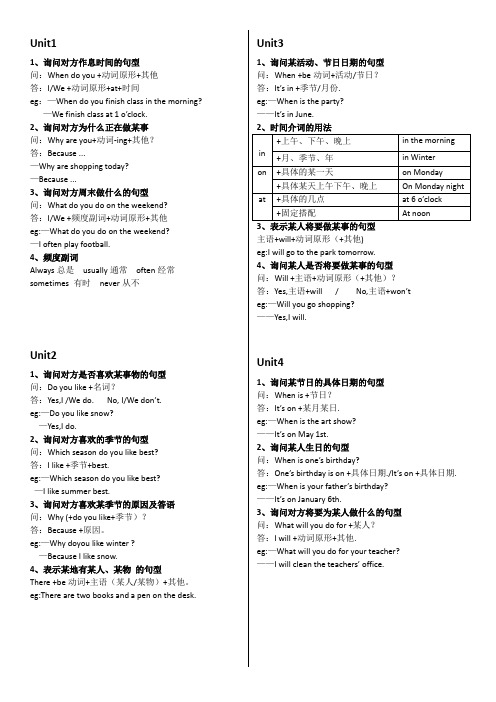
Unit11、询问对方作息时间的句型问:When do you +动词原形+其他答:I/We +动词原形+at+时间eg:—When do you finish class in the morning?—We finish class at 1 o’clock.2、询问对方为什么正在做某事问:Why are you+动词-ing+其他?答:Because ...—Why are shopping today?—Because ...3、询问对方周末做什么的句型问:What do you do on the weekend?答:I/We +频度副词+动词原形+其他eg:—What do you do on the weekend?—I often play football.4、频度副词Always总是usually通常often经常sometimes 有时never从不Unit21、询问对方是否喜欢某事物的句型问:Do you like +名词?答:Yes,I /We do. No, I/We don’t. eg:—Do you like snow?—Yes,I do.2、询问对方喜欢的季节的句型问:Which season do you like best?答:I like +季节+best.eg:—Which season do you like best?—I like summer best.3、询问对方喜欢某季节的原因及答语问:Why (+do you like+季节)?答:Because +原因。
eg:—Why doyou like winter ?—Because I like snow.4、表示某地有某人、某物的句型There +be动词+主语(某人/某物)+其他。
eg:There are two books and a pen on the desk.Unit31、询问某活动、节日日期的句型问:When +be动词+活动/节日?答:It’s in +季节/月份.eg:—When is the party?——It’s in June.主语+will+动词原形(+其他)eg:I will go to the park tomorrow.4、询问某人是否将要做某事的句型问:Will +主语+动词原形(+其他)?答:Yes,主语+will / No,主语+won’t eg:—Will you go shopping?——Yes,I will.Unit41、询问某节日的具体日期的句型问:When is +节日?答:It’s on +某月某日.eg:—When is the art show?——It’s on May 1st.2、询问某人生日的句型问:When is one’s birthday?答:One’s birthday is on +具体日期./It’s on +具体日期. eg:—When is your father’s birthday?——It’s on January 6th.3、询问对方将要为某人做什么的句型问:What will you do for +某人?答:I will +动词原形+其他.eg:—What will you do for your teacher?——I will clean the teachers’ office.1、描述物品归属的句型物品+ be动词(is/are)+(mine/his/hers/yours/ours/theirs) eg:The book is yours.2、确认物品归属地句型问:be动词+this/that/these/those(+其他)+某人的?答:Yes,it is. Yes,they are./ No,it,is’t. No,they aren’t. eg:—Is that crayou his?——Yes,it is.3、询问物品归属的句型问:单数Whose+is it/this/that?复数Whose+are they/these/those?答:It’s/They’re+名词性物主代词/ 名词所有格eg:—Whose bag is this?——It’s mine.4、现在进行时的一般疑问句问:Be动词+主语+动词-ing(+其他)?答:Yes,主语+be动词/ No,主语+be动词+not. eg:—Is she listening to music?——Yes,she is.5、描述某人正在做某事主语+be动词(am/is/are)+动词-ing(+其他).eg:I’m doing my homework now.6、询问某人能否做某事问:Can+主语+动词原形+其他?答:Yes,主语+can. /No,主语+can’t.eg:—Can I play football?——Yes,you can.Unit61、询问多个人或动物正在做什么的句型问:What are +主语(复数)+doing?答:主语(复数)+are+动词-ing+其他.eg:—What are the boys doing?——They are jumping2、询问单个人或动物正在做什么的句型问:What is +主语(单数)+doing?答:主语(单数)+is+动词-ing+其他.eg:—What is Tom doing?——He is playing football.。
人教版小学英语(三年级起点)五年级下册词汇(带音标)

summer
['sʌmə]
夏天
autumn/fall
秋天
winter
['wɪntə]
冬天
season
['siːzn]
季节
picnic
['pɪknɪk]
野餐
go on a picnic
去野餐
pick
[pɪk]
摘;采集
pick apples
摘苹果
snowman
['snəʊˌmæn]
雪人
make a snowman
leaf
[liːf]
叶子
fall
[fɔːl]
落下;秋天
paint
[peɪnt]
用颜料绘画
Unit 3
January
['dʒænjʊeri]
一月
February
['febrʊəri]
二月
March
[mɑːtʃ]
三月
April
['eɪprəl]
四月
May
[meɪ]
五月
June
[dʒuːn]
六月
July
[dʒuː'laɪ]
like
[laɪk]
像`````那样
Unit 6
doing morning exercise
做早操
having…class
上……课
reading a book
(正在)看书
listening to music
正在听音乐
keep
[kiːp]
保持某种状态
keep to the right
靠右
人教版小学五年级英语下册重点知识归类
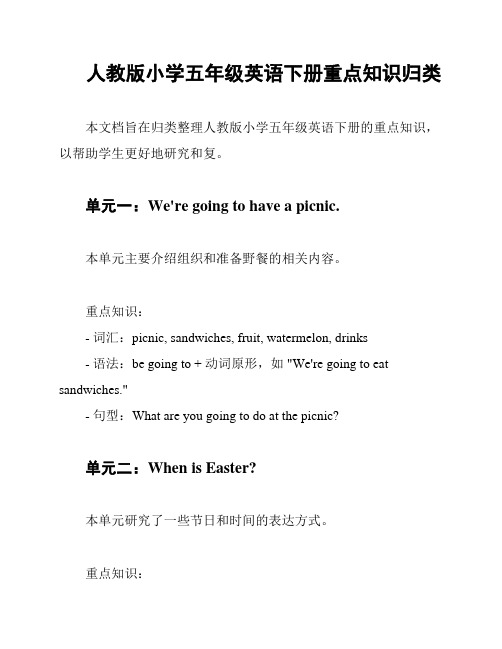
人教版小学五年级英语下册重点知识归类本文档旨在归类整理人教版小学五年级英语下册的重点知识,以帮助学生更好地研究和复。
单元一:We're going to have a picnic.本单元主要介绍组织和准备野餐的相关内容。
重点知识:- 词汇:picnic, sandwiches, fruit, watermelon, drinks- 语法:be going to + 动词原形,如 "We're going to eat sandwiches."- 句型:What are you going to do at the picnic?单元二:When is Easter?本单元研究了一些节日和时间的表达方式。
重点知识:- 词汇:Easter, Christmas, New Year's Day, Halloween- 语法:疑问词when和具体时间的表达,如 "When is Easter?"- 句型:When is Christmas?单元三:Do you want to go to a movie?本单元研究了表达意愿和邀请的相关内容。
重点知识:- 词汇:movie, park, zoo, museum, swimming pool- 语法:do you want to + 动词原形,如 "Do you want to go to a movie?"- 句型:Do you want to go to the park?单元四:Can you swim?本单元介绍了一些体育运动和能力的表达方式。
重点知识:- 词汇:swim, run, jump, skate, ride- 语法:can + 动词原形,如 "Can you swim?"- 句型:Can you ride a bike?单元五:What's the matter with you?本单元主要研究了描述身体状况和感受的表达方式。
人教版PEP小学英语五年级下册知识点汇总(最新)
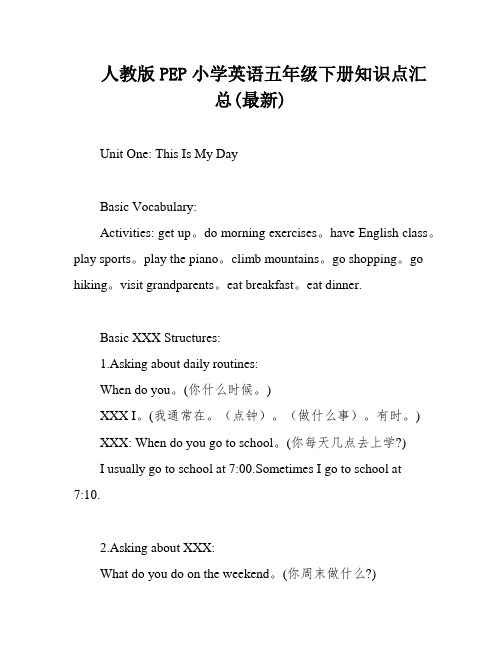
人教版PEP小学英语五年级下册知识点汇总(最新)Unit One: This Is My DayBasic Vocabulary:Activities: get up。
do morning exercises。
have English class。
play sports。
play the piano。
climb mountains。
go shopping。
go hiking。
visit grandparents。
eat breakfast。
eat dinner.Basic XXX Structures:1.Asking about daily routines:When do you。
(你什么时候。
)XXX I。
(我通常在。
(点钟)。
(做什么事)。
有时。
)XXX: When do you go to school。
(你每天几点去上学?)I usually go to school at 7:00.Sometimes I go to school at7:10.2.Asking about XXX:What do you do on the weekend。
(你周末做什么?)XXX I。
(我通常/经常。
有时。
)XXX: What do you do on the weekend?I often play XXX I go shopping with my mom.3.Introducing one's own habits:Every weekend。
I go hiking。
(我每个周末远足。
)Every day。
I do my homework at 8:00 in the evening。
(我每天晚上8点做作业。
)4.Asking XXX:What do you do。
(你是干什么的?)Time:morning。
afternoon。
evening。
noon。
at night。
6:00.on Sunday。
人教版五年级下册英语第五单元重点短语
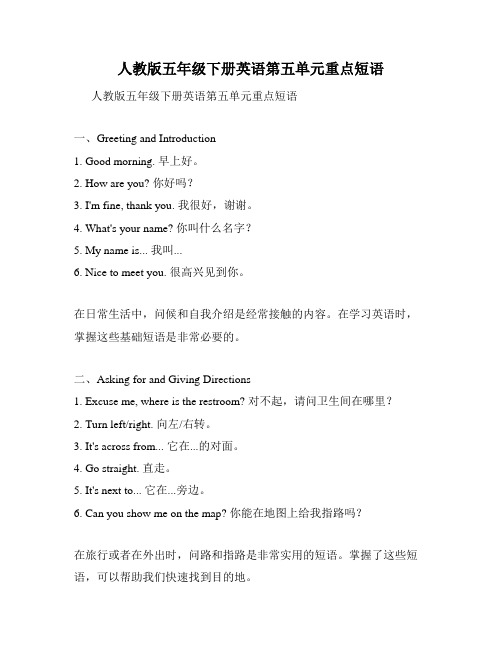
人教版五年级下册英语第五单元重点短语人教版五年级下册英语第五单元重点短语一、Greeting and Introduction1. Good morning. 早上好。
2. How are you? 你好吗?3. I'm fine, thank you. 我很好,谢谢。
4. What's your name? 你叫什么名字?5. My name is... 我叫...6. Nice to meet you. 很高兴见到你。
在日常生活中,问候和自我介绍是经常接触的内容。
在学习英语时,掌握这些基础短语是非常必要的。
二、Asking for and Giving Directions1. Excuse me, where is the restroom? 对不起,请问卫生间在哪里?2. Turn left/right. 向左/右转。
3. It's across from... 它在...的对面。
4. Go straight. 直走。
5. It's next to... 它在...旁边。
6. Can you show me on the map? 你能在地图上给我指路吗?在旅行或者在外出时,问路和指路是非常实用的短语。
掌握了这些短语,可以帮助我们快速找到目的地。
三、Numbers and Time1. How much is it? 它多少钱?2. It's twenty dollars. 它是二十美元。
3. What time is it? 几点了?4. It's 8 o'clock. 8点。
5. Can you tell me the time? 你能告诉我时间吗?6. It's a quarter past nine. 九点一刻了。
在日常生活中,我们需要了解数字和时间的表达。
这些短语可以帮助我们顺利完成日常生活的事务。
四、Food and Drink1. I'd like a hamburger, please. 我要一个汉堡包。
人教版五年级英语下册全册知识点总结
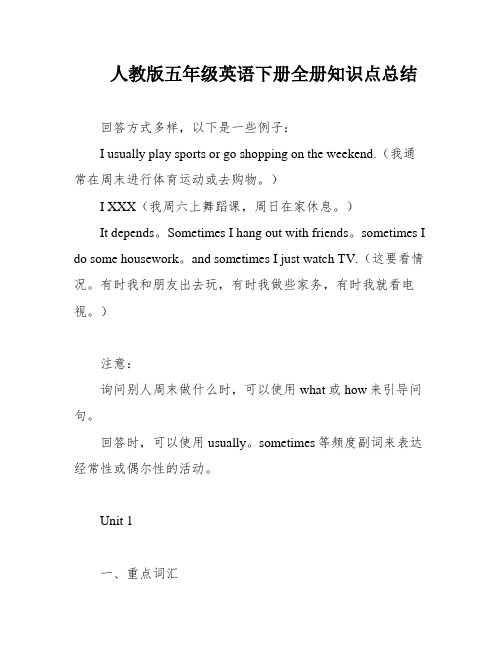
人教版五年级英语下册全册知识点总结回答方式多样,以下是一些例子:I usually play sports or go shopping on the weekend.(我通常在周末进行体育运动或去购物。
)I XXX(我周六上舞蹈课,周日在家休息。
)It depends。
Sometimes I hang out with friends。
sometimes I do some housework。
and sometimes I just watch TV.(这要看情况。
有时我和朋友出去玩,有时我做些家务,有时我就看电视。
)注意:询问别人周末做什么时,可以使用what或how来引导问句。
回答时,可以使用usually。
sometimes等频度副词来表达经常性或偶尔性的活动。
Unit 1一、重点词汇吃早餐:eat breakfast 上······课:have。
class进行体育运动:play sports做早操:do morning exercises 打扫我的房间:clean my room 去购物:go shopping舞蹈:dancing上午:a.m.通常地:usually二、其他日常活动起床:get up上床睡觉:go to bed活动,运动:exercise吃晚饭:eat XXX散步:go for a walk研究,上(课):XXX上舞蹈课:take a dancing class下午:p.m.吃午饭:eat XXX洗脸:XXX洗我的衣服:XXX看电视:watch TV打乒乓球:play ping-pong弹琵琶:play the pipa去游泳:go swimming去跑步:go running做作业:do homework练武术:do XXX踢足球:play football打篮球:play basketball三、语音cl→ [cl]:clean。
(完整版)人教版小学PEP英语五年级下册知识点归纳

人教版小学PEP英语五年级下册知识点归纳PEP五年级英语下册各单元知识点Unit 1 My day一、重点词汇。
1.四会词汇:eat breakfast 吃早饭 have···class 上······课play sports 进行体育运动exercise 活动;运动 domorning exercises做早操eat dinner吃晚饭clean my room 打扫我的房间go shopping 去买东西;购物go for a walk 散步take学习;上(课) dancing跳舞;舞蹈 take a dancing class 上舞蹈课2. 三会词汇:when什么时候after 在(时间)后start 开始usually 通常地;惯常地Spain 西班牙late 晚;迟 a.m. 午前;上午 p.m. 午后;下午why 为什么shop 去买东西;购物work 工作last 上一个的;刚过去的sound 听起来好像also 还;也busy 忙的 need 需要play 戏剧;剧本letter 信live 居住island 岛always 总是;一直cave 山洞;洞穴go swimming 去游泳 win 获胜二、其他日常活动。
get up起床 eat lunch吃午饭 go to bed 上床睡觉wash my face洗脸 wash my clothes 洗我的衣服 watch TV看电视play ping-pong打乒乓球 playthe pipa弹琵琶 go swimming去游泳go running去跑步 do homework 做作业 do kung fu练武术play football踢足球 play basketball打篮球三、频度副词。
always总是,一直(100%) usually通常(80%)often 经常(60%) sometimes(30%)有时四、疑问词。
Unit1Myday(知识清单)人教PEP版英语五年级下册(1)

五年级下册第一单元P4重点内容一、单词1.finish完成;结束2.then然后3.after在...之后4.start开始ually通常6.Spain西班牙te晚的二、词组1.finish class结束课程2.in the morning在早上3.at home在家4.go back to school返回学校5.after lunch午饭后6.in Spain在西班牙7.too late太晚了8.at night在晚上三、句型1、When do you finish class in the morning?你们早上什么时候结束课程?We finish class at 1 o’clock.我们一点钟结束课程。
提炼:When do you+动词/动词词组+其他?I/We+动词/动词词组+at+时间.替换:When do you go back to school after lunch?I go back to school at 2:30.2、When do you usually eat dinner in Spain?你们在西班牙什么时候吃晚饭?Usually at 9:30.通常在九点半。
完整性回答:I usually eat dinner at 9:30.拓展:常见的频率副词always总是usually通常often经常sometimes有时seldom很少never从不练习:1.完成;结束__________2.然后__________3.在...之后__________4.开始__________5.通常__________6.西班牙__________7.晚的__________8.结束课程__________9.在早上__________10.在家__________11.返回学校__________12.午饭后__________13.在西班牙__________14.太晚了__________15.在晚上__________16.你们早上什么时候结束课程?__________17.我们一点钟结束课程。
人教版小学英语五年级下册各单元知识点

人教版小学英语五年级下册各单元知识点Unit 1: My dayIn this unit, students learn to talk about their daily routines and the time in English. They also learn to express their likes and dislikes about different activities.Some of the key vocabulary words and phrases include:- Get up- Have breakfast- Go to school- Have lunch- Have dinner- Watch TV- Play games- Read books- Do homework- Brush teeth- Go to bedStudents are introduced to the verb "to be" and learn how to make simple sentences with it, such as "I am happy" or "He is tired". They also practice asking and answering questions using "what", "when", and "where".Unit 2: Colors and clothesIn this unit, students learn to identify and name colors, clothing items, and accessories in English. They also learn to describe their own clothing and what they are wearing.Some of the key vocabulary words and phrases include:- Red- Blue- Green- Yellow- Orange- Purple- Pink- White- Black- T-shirt- Dress- Pants- Skirt- Shoes- Socks- Hat- Bag- SunglassesStudents learn about the use of prepositions such as "on", "in", and "under" to describe clothing and daily routines. They also practice using adjectives to describe colors and clothing, and learn to ask and answer questions such as "What color is your shirt?" and "What are you wearing today?"Unit 3: Food and drinksIn this unit, students learn to talk about different types of food and drinks in English. They also learn about healthy eating habits and meal times.Some of the key vocabulary words and phrases include:- Pizza- Sandwich- Rice- Noodles- Salad- Fruit- Vegetables- Juice- Milk- Water- Breakfast- Lunch- Dinner- SnackStudents learn about the use of countable and uncountable nouns when talking about food and drinks. They also practice using the articles "a", "an", and "the" correctly. They learn to express likes and dislikes about different foods and drinks using the verb "to like" and "to dislike".Unit 4: Holidays and festivalsIn this unit, students learn about different holidays and festivals celebrated around the world. They learn to talk about the traditions, customs, and symbols associated with these celebrations.Some of the key vocabulary words and phrases include:- Christmas- Easter- Halloween- New Year- Valentine's Day- Thanksgiving- Dragon Boat Festival- Mid-Autumn Festival- Lantern Festival- Traditions- Customs- Symbols- FireworksStudents learn to ask and answer questions about holidays and festivals. They learn to use vocabulary related to greetings, gifts, and decorations. They also practice using the verb "to celebrate" to talk about different celebrations.Unit 5: Animals and petsIn this unit, students learn about different types of animals and pets. They learn to describe their appearance, behavior, and habitat. Some of the key vocabulary words and phrases include:- Dog- Cat- Fish- Bird- Rabbit- Hamster- Snake- Monkey- Elephant- Tiger- Giraffe- Zoo- Forest- Sea- SkyStudents learn to use adjectives to describe animals, such as "cute", "fierce", or "big". They practice asking and answering questions about pets and their owners, and learn about basic pet care and responsibilities.Unit 6: Weather and seasonsIn this unit, students learn to talk about different types of weather and the four seasons. They learn to express their preferences and activities associated with each season.Some of the key vocabulary words and phrases include:- Sunny- Cloudy- Rainy- Snowy- Windy- Spring- Summer- Fall/Autumn- Winter- Sun- Rain- Snow- Leaves- FlowersStudents learn to use verbs to describe weather and activities, such as "to swim" or "to play snowballs". They also practice using simple present tense to make statements and ask questions. They learn to use adjectives to describe weather, such as "beautiful", "hot", or "cold".Unit 1: My dayIn this unit, students will be introduced to the basic vocabulary and phrases related to their daily routines and the time.The teacher can start by asking students when they usually wake up, and elicit the verb "to get up". Then, the class can work on making sentences like "I get up at 7 o'clock in the morning" or "He gets up early". The teacher can also introduce basic adverbs of frequency, such as "always", "usually", "sometimes", and "never".The class can then move on to discussing meals, such as breakfast, lunch, and dinner. Students can practice using the verb "to have" to describe what they eat and drink, such as "I have cereal and milk for breakfast" or "She has a sandwich for lunch". They can also learn to talk about their favorite foods and drinks, and use expressions like "I like" or "I don't like".The teacher can also introduce basic verbs related to daily activities, such as "to go", "to come", "to watch", "to play", "to read", and "to do". Students can learn to make sentences like "I go to school by bus" or "He plays games after school". The teacher can also teach prepositions of place, such as "at", "in", and "on", todescribe daily routines in more detail.Finally, the class can practice telling time in English, using both the 12-hour and 24-hour clock formats. Students can work on making sentences such as "It's 7 o'clock" or "It's half past nine". Unit 2: Colors and clothesIn this unit, students will learn to identify and name different colors, clothing items, and accessories.The teacher can start by introducing basic colors, such as red, blue, green, yellow, and so on. Students can practice using colors to describe different objects, such as "a red car" or "a blue shirt". The class can also work on making sentences like "I like wearing green clothes" or "She has a pink bag".Next, the teacher can introduce different types of clothing, such as T-shirts, dresses, pants, skirts, shoes, socks, hats, and bags. The class can learn to use prepositions of place to describe clothing, such as "on", "in", or "under". For example, "I wear my T-shirt under my jacket" or "She puts her shoes in the closet".The class can also learn about different accessories, such as sunglasses, watches, and jewelry. Students can practice using vocabulary to describe accessories, and make sentences like "He wears a watch on his wrist" or "She likes wearing earrings". Finally, the teacher can introduce the concept of describing what someone is wearing. The class can practice using adjectives to describe clothing, such as "casual", "formal", or "fancy". They canalso practice asking and answering questions about each other's outfits, such as "What are you wearing today?" or "Do you like my shirt?"Unit 3: Food and drinksIn this unit, students will learn about different types of food and drinks, and healthy eating habits.The teacher can start by introducing basic food vocabulary, such as pizza, sandwich, noodles, salad, fruit, and vegetables. Students can practice using the verb "to have" to describe what they eat and drink, and learn to make sentences like "I have a banana for breakfast" or "She has a salad for lunch".The class can also learn about different types of drinks, such as juice, milk, and water. They can practice using vocabulary to describe drinks and make sentences like "He drinks orange juice in the morning" or "She likes drinking milk before bed".Next, the teacher can introduce vocabulary related to meal times, such as breakfast, lunch, dinner, and snack. The class can learn to use the correct articles "a", "an", and "the" when talking about food and drink, and practice making sentences like "I have an apple for a snack" or "We eat dinner at 6 o'clock".Finally, the class can learn about healthy eating habits, such as eating fruits and vegetables, and drinking enough water. They can practice expressing likes and dislikes about different foods and drinks using the verbs "to like" and "to dislike", and learn to make sentences like "I like apples but I dislike broccoli".Unit 4: Holidays and festivalsIn this unit, students will learn about different holidays and festivals celebrated around the world.The teacher can start by asking students if they celebrate any special holidays or festivals, and elicit different types of celebrations. Then, the class can learn about some of the most common holidays and festivals, such as Christmas, Easter, and Halloween, and discuss their traditions and customs.Next, the class can learn about different traditions and symbols associated with holidays and festivals from different cultures. For example, they can learn about the dragon boat festival in China, the mid-autumn festival in Vietnam, and the lantern festival in Japan.The teacher can also introduce vocabulary related to greetings, gifts, and decorations. Students can practice making sentences like "I gave my mom a card for Mother's Day" or "We decorate the Christmas tree with ornaments". The class can also practice using the verb "to celebrate" to talk about different celebrations.Finally, the class can learn about how holidays and festivals are celebrated in different countries and cultures. They can learn about different foods, costumes, and activities associated with each celebration.Unit 5: Animals and petsIn this unit, students will learn about different types of animals andpets.The teacher can start by asking students what animals they like or dislike, and elicit different types of animals. Then, the class can learn to identify and name different animals, such as dogs, cats, fish, birds, and so on.Next, the class can learn about different types of pets, such as dogs, cats, hamsters, and rabbits. They can practice using vocabulary to describe pets and make sentences like "I have a dog named Max" or "She likes to play with her cat".The teacher can also introduce vocabulary related to animal behavior, such as "cute", "fierce", or "friendly". The class can learn to use adjectives to describe animals, and practice making sentences like "The tiger is fierce but the bunny is cute".Finally, the class can learn about basic pet care and responsibilities. They can learn about feeding, grooming, and playing with pets, and practice making sentences like "I walk my dog every evening" or "She cleans her fish tank every week".Unit 6: Weather and seasonsIn this unit, students will learn to talk about different types of weather and the four seasons.The teacher can start by asking students what their favorite season is, and elicit different types of seasons. Then, the class can learn to identify and name different types of weather, such as sunny, cloudy, rainy, and snowy.Next, the class can learn about the different activities and events associated with each season. For example, they can learn about swimming and camping in the summer, apple picking and Halloween in the fall, skiing and ice skating in the winter, and gardening and Easter in the spring.The teacher can also introduce basic verbs related to weather and activities, such as "to swim", "to play", or "to ski". Students can practice making sentences like "I swim in the lake on hot days" or "She skis with her family in the winter".Finally, the class can learn to express their preferences and dislikes about each season, using expressions like "I love spring because of the flowers" or "I don't like winter because it's too cold". They can learn to use adjectives to describe weather, such as "beautiful", "hot", or "cold", and practice asking and answering questions using simple present tense.。
人教版PEP五年级英语下册各单元词汇点
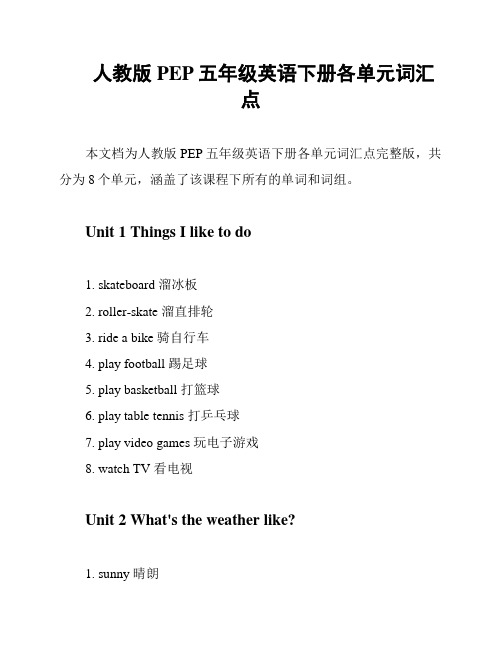
人教版PEP五年级英语下册各单元词汇点本文档为人教版PEP五年级英语下册各单元词汇点完整版,共分为8个单元,涵盖了该课程下所有的单词和词组。
Unit 1 Things I like to do1. skateboard 溜冰板2. roller-skate 溜直排轮3. ride a bike 骑自行车4. play football 踢足球5. play basketball 打篮球6. play table tennis 打乒乓球7. play video games 玩电子游戏8. watch TV 看电视Unit 2 What's the weather like?1. sunny 晴朗2. cloudy 多云3. rainy 下雨4. snowy 下雪5. windy 有风6. hot 热7. cold 冷Unit 3 At a pet shop1. parrot 鹦鹉2. rabbit 兔子3. hamster 仓鼠4. cat 猫5. dog 狗6. fish 鱼7. turtle 乌龟Unit 4 My family 1. grandfather 爷爷2. grandmother 奶奶3. father 爸爸4. mother 妈妈5. older brother 哥哥6. older sister 姐姐7. younger brother 弟弟8. younger sister 妹妹Unit 5 My school day1. classroom 教室2. library 图书馆3. playground 操场4. art room 美术室5. music room 音乐室7. canteen 食堂8. restroom 卫生间Unit 6 Fun with nature1. flowers 花2. grass 草3. trees 树木4. leaves 叶子5. rocks 石头6. mountains 山7. rivers 河流Unit 7 Countryside holidays1. tent 帐篷2. sleeping bag 睡袋3. campfire 篝火4. fishing rod 钓鱼竿5. boat 船6. bike 自行车7. camera 照相机Unit 8 Where's my schoolbag?1. schoolbag 书包2. desk 课桌3. chair 椅子4. blackboard 黑板5. pencil case 铅笔盒6. ruler 尺子7. eraser 橡皮擦以上为本文档的单词和词组列表,希望能够帮助学习人教版PEP五年级英语下册的同学们更好地掌握课程内容。
人教版英语五年级下册知识点总结

人教版英语五年级下册知识点总结一、词汇核心词汇学校生活:classroom, library, playground, office, restroom, schedule, lesson, homework, break, lunch家庭成员:family, father, mother, brother, sister, uncle, aunt, cousin日常活动:get up, go to bed, wash face, brush teeth, eat breakfast, do homework, watch TV, play computer games 食物与饮料:hamburger, hot dog, sandwich, pizza, cake, cookie, milk, juice, water拓展词汇学科名称:math, science, Chinese, English, PE, art, music 颜色与衣物:red, blue, yellow, green, white, black, shirt, pants, shoes, hat, socks动物与植物:cat, dog, fish, bird, rabbit, flower, tree, grass, leaf节假日与活动:birthday, Christmas, Spring Festival, summer vacation, winter vacation, party, picnic二、语法现在进行时表达正在进行的动作或状态。
be动词(am/is/are)+动词-ing形式。
例句:What are you doing? I am reading a book. They are playing football.一般现在时表达经常性的行为或状态。
主语为第三人称单数时,动词形式要发生改变。
例句:She always washes her hands before meals. He often watches TV in the evening.一般过去时表达过去某个时间发生的动作或状态。
五年级下册英语书常用表达法

五年级下册英语书常用表达法(人教版)以下是人教版五年级下册英语书中的一些常用表达法及其重点:
重点句型:
1. - When do you finish class in the morning? 你们上午的课到几点结束?
- We finish class at 1 o'clock. 我们一点钟结束上午的课。
2. - What do you do on the weekend? 你周末做什么?
- I often watch TV and play ping-pong with my father. 我经常看电视,也常和我爸爸一起打乒乓球。
3. - Which season do you like best? 你最喜欢哪个季节?
- I like spring best. 我最喜欢春天。
4. - Why? 为什么?
- Because there are many beautiful flowers. 因为有许多美丽的花。
5. - When is Tree Planting Day? 植树节在什么时候?
- It's in March. 在三月。
常用表达法:
1. go on a picnic 去野餐
2. pick apples 摘苹果
3. make a snowman 堆雪人
4. go swimming 去游泳
5. Which season do you like best? 你最喜欢哪个季节?
6. Why? 为什么?
7. Because I like summer vacation. 因为我喜欢暑假。
以上是五年级下册英语书中的一些重点句型和常用表达法。
人教版小学五年级下册英语知识点复习
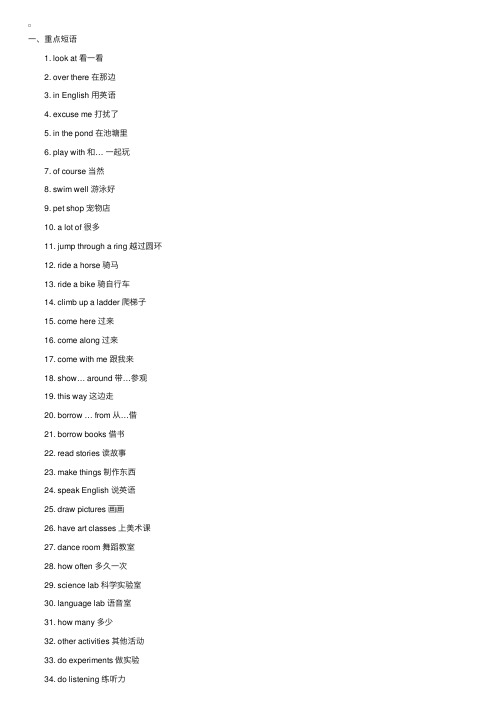
⼀、重点短语 1. look at 看⼀看 2. over there 在那边 3. in English ⽤英语 4. excuse me 打扰了 5. in the pond 在池塘⾥ 6. play with 和… ⼀起玩 7. of course 当然 8. swim well 游泳好 9. pet shop 宠物店 10. a lot of 很多 11. jump through a ring 越过圆环 12. ride a horse 骑马 13. ride a bike 骑⾃⾏车 14. climb up a ladder 爬梯⼦ 15. come here 过来 16. come along 过来 17. come with me 跟我来 18. show… around 带…参观 19. this way 这边⾛ 20. borrow … from 从…借 21. borrow books 借书 22. read stories 读故事 23. make things 制作东西 24. speak English 说英语 25. draw pictures 画画 26. have art classes 上美术课 27. dance room 舞蹈教室 28. how often 多久⼀次 29. science lab 科学实验室 30. language lab 语⾳室 31. how many 多少 32. other activities 其他活动 33. do experiments 做实验 34. do listening 练听⼒ 35. observe things 观察事物 36. do speaking 练⼝语 37. New Year’s Day 元旦 38. meeting hall 会议⼤厅 39. Children’s Day ⼉童节 40. be good at 擅长 41. be interested in 对…感兴趣 42. music club ⾳乐俱乐部 43. no one 没有⼈ 44.play the violin 拉⼩提琴 45. art club 美术俱乐部 46. come into 进⼊ 47.listen to music 听⾳乐 48. cut out 剪下 49. come from 来⾃ 50. up and down 上上下下 51. in groups 成组 52. science corner 科学⾓ 53. group work ⼩组活动 54. do project work 做项⽬制作 55. art corner 美术⾓ 56. computer corner 电脑⾓ 57.play football 踢⾜球 58. be famous for 因…闻名 59. study plants and animals 研究动植物 60. do exercises 做运动 61. on the field 在操场上 62. do printing on the paper 在纸上印刷 63. how about …怎么样? 64.go on field trips ⽥野考察 65. play volleyball 打排球 66. play basketball 打篮球 67. play hockey 打曲棍球 68. play rugby 打橄榄球 69. in the forest 在森林⾥ 70. have a look at 看⼀看 71. here you are 给你 72. how much 多少(钱) 73. a pair of ⼀双;⼀对 74. try on 试穿 75. shoe shop 鞋店 76. clothes shop 服装店 77. make a shopping list 做购物单 78. sports shop 体育⽤品商店 79. cake shop 蛋糕店 80. pay for 付钱 81. feel well 感觉好 82. see a doctor 看医⽣ 83. take good care of 好好照顾 84. have a bad cold 得了重感冒 85. have a fever 发烧 86. have a stomachache 胃疼 87. have a headache 头疼 88. have a toothache ⽛疼 89. have a cough 咳嗽 90. go to a concert 听⾳乐会 91. do maths problems 做数学题 92. go to the music club 去⾳乐俱乐部 93. have to 不得不 94. stay in bed 待在床上 95. get well 康复 96. be worried about 担⼼ 97. don’t worry 别担⼼ 98.help … with 帮助…做某事 99. in the hospital 在医院⾥ ⼆、重点短语讲解 1. play with 和…⼀起玩 play with sb.(某⼈) 和…⼀起玩 play with sth.(某物) 玩某物 e.g. Lucy and Lily are playing with their mother. Lucy and Lily are playing with their doll. 2. a lot of 很多 a lot of = lots of + 可数名词复数或不可数名词 e.g. 同义句转换 There are a lot of apples on the table. = There are ______ ______ apples on the table. (答案:lots of) 3. how often 多久⼀次 how often 是⼀个特殊疑问词,就频率提问。
小学英语短语人教版五年级下册短语

小学英语短语:人教版五年级下册短语以下是整理的“小学英语短语:人教版五年级下册短语”内容,供大家参考学习,希望大家可以仔细阅读。
若想了解更多“小学英语短语”的相关内容,可以关注,小编会持续为大家更新。
Unit1many years ago 许多年前every day 每天talk to us 和我们谈话talk about her life 谈论她的生活lots of 许多a TV program 一个电视节目watch TV 看电视last night 昨晚cook on fire 用炉火做饭work in the fields 在田里工作in England 在英国Unit2three years ago 三年前teach Chinese 教语文walk to school 步行去学校write letters 写信study hard 努力学习send an email 发送电子邮件a good pupil 一个好学生by school bus 乘坐校车learn English 学英语Unit3fish and chips 鱼和薯条at school 在学校have dinner 吃晚饭a traditional English dinner 一顿传统的英式晚餐English food 英国饭have sandwiches 吃三明治have breakfast 吃早饭have lunch 吃午饭Unit4excuse me 打扰一下in two weeks’time 在两周内library card 图书卡on Shelf C 在C架上a book about computers 一本关于电脑的书be good at 擅长find out 找到train information 火车信息Chinese food 中国菜want to know 想知道on the CD-ROM 在只读光盘上in the timetable 在时刻表说Chinese words 汉语词语in the dictionary 在字典里in the newspaper 在报纸上in the library 在图书馆里at the zoo 在动物园里on TV 在电视上bring back 带回来make an e-card for 为…制作电子贺卡Unit5look at 看take…to China 把…带到中国be easy for 对…容易a blue T- shirt 一件蓝色的体恤衫two pockets 两个口袋four wheels 四个轮子Unit6of course 当然in the west of China 在中国的西部in the north of China 在中国的北部ride a horse 骑马last year 去年in July 在七月my uncle 我的叔叔every year 每年some photos of China 一些中国的照片climb the Tianshan Mountain 爬天山Unit7at work 在工作send an email 发电子邮件another computer 另一台电脑write a message 写信息a computer message 一条电脑信息work very hard 工作很努力from…to …从…到…at the office 在办公室a good idea 好主意at four o’clock在四点click on 点击dad’s computer 爸爸的电脑Unit8on the phone 在电话里in the summer 在夏天give him a kite 给他一个风筝how about 关于…怎么样come quickly 快过来a dragon kite 一个龙风筝on the tree 在树上the same as 与…一样Unit9have got 拥有two letters in English 两封用英语写的信go to a children’s theatre 去儿童剧院wear men’s clothes 穿男人的衣服laugh a lot 大笑told lots of jokes 讲了许多笑话after the show 演出之后in three weeks 在三周之内Chinese history 中国历史in the evening 在晚上borrow a bike for you 给你借了一辆自行车Unit10at the airport 在机场make a list 列清单go to the airport 去机场tomorrow morning 明早in New York 在纽约a yellow taxi 一辆黄色的出租车tall building 高楼大厦speak English 讲英语make Chinese food for me 为我做中国食物try American food 尝美国食物write again 再回信。
Unit2Myfavouriteseason(知识清单)五年级英语下册(人教PEP版)教师版
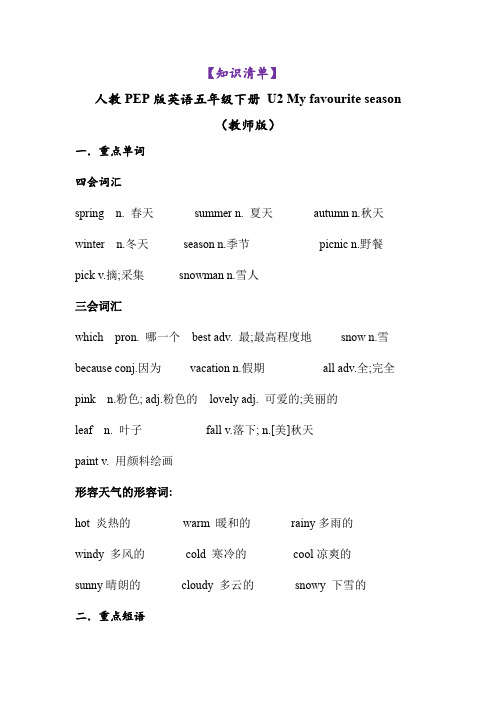
【知识清单】人教PEP版英语五年级下册U2 My favourite season(教师版)一.重点单词四会词汇spring n. 春天summer n. 夏天autumn n.秋天winter n.冬天season n.季节picnic n.野餐pick v.摘;采集snowman n.雪人三会词汇which pron. 哪一个best adv. 最;最高程度地snow n.雪because conj.因为vacation n.假期all adv.全;完全pink n.粉色; adj.粉色的lovely adj. 可爱的;美丽的leaf n. 叶子fall v.落下; n.[美]秋天paint v. 用颜料绘画形容天气的形容词:hot 炎热的warm 暖和的rainy多雨的windy 多风的cold 寒冷的cool凉爽的sunny晴朗的cloudy 多云的snowy 下雪的二.重点短语plant flowers 种花play in the snow 在雪中玩耍play with snow玩雪eat ice cream 吃冰激淋fly kites 放风筝go on a picnic 去野餐pick apples摘苹果;make a snowman堆雪人;good job 做得好; go swimming去游泳. 四.重点句型1. 今天我们将要画季节。
Today we'll draw the seasons.2. 你最喜欢哪个季节?Which season do you like best?3.我可以每天去游泳!I can go swimming every day!4.看我的图片。
Look at my picture.5.颜色很漂亮!The colours are very pretty!6. 为什么? 因为我喜欢暑假!Why? Because I like summer vacation!7.我最喜欢春天。
人教版五年级下册英语知识点

五年级下册英语第一单元知识点整理1、主要单词和短语:domorningexerciseseatbreakfast haveEnglishclass eatdinner playsports eatlunch climbmountains goshopping playthepiano visitgrandparents gohiking 晨练,做早操吃早饭上英语课吃晚饭进行体育活动吃午饭爬山购物,买东西弹钢琴看望〔外〕祖父母去远足二、主要句子:Whendoyoueatdinner?Ieatdinnerat7:00intheevening. Whendoyougetup? Iusuallygetupat12:00atnoon. Whatdoyoudoontheweekend? UsuallyIwatchTVandgoshopping.你什么时候吃晚饭?我晚上七点吃晚饭。
你什么时候起床?我通常在中午12点起床。
你在周末干什么?我通常看电视和购物。
Ioftenplayfootball.SometimesIgohiking.我经常踢足球。
有时候我去远足。
三、重要知识点同义词:eatbreakfast-havebreakfast,playsports-dosports,eatlunch-havelunch,usually-ofteneatdinner-havedinner复数形式:policeman-policemenpolicewoman-policewomen现在分词:tell-telling第三人称单数:say-says同义句:Whatdoyoudo?---Whatareyou? 你是干什么的?表示频度的副词:always总是,一直;usually通常,常常;often经常;sometimes有时以复数形式出现的词组:v isitgrandparents,planttrees介词后跟表示时间的词语时,表示在某年、某月、某个季节,某个时候〔在上午,在下午,在晚上〕用in;表示在某一天,在星期几用on,在具体的几点几分用too和either的用法区别:too和either都是“也〞的意思,但at.too用于肯定句,either用于否认句。
- 1、下载文档前请自行甄别文档内容的完整性,平台不提供额外的编辑、内容补充、找答案等附加服务。
- 2、"仅部分预览"的文档,不可在线预览部分如存在完整性等问题,可反馈申请退款(可完整预览的文档不适用该条件!)。
- 3、如文档侵犯您的权益,请联系客服反馈,我们会尽快为您处理(人工客服工作时间:9:00-18:30)。
小学五年级英语下册Unit1—Unit3短语复习best friend 最好的朋友
over there 在那边
in English 用英语表示
young animals小动物
very much非常,很
Me too.我也是
in the pond 在池塘里
of course 当然
play together 一起玩
a lot of things 很多东西
jump through a ring 跳圈
climb up a ladder爬梯子
ride a bike 骑自行车
ride a horse 骑马
borrow books 借书
read stories读故事
make things制作东西
our headmaster我们的校长
show you around带你看一看
this way这边走
science lab科学实验室
language lab语音室
have science classes上科学课
twice a week一周两次
other activities其它活动
do experiments做实验
observe things 观察事物
do listening听
meeting hall会议厅
new building新建筑
Children’s Day儿童节
New Year’s Day新年
play the violin拉提琴
listen to music听音乐
music club音乐俱乐部
五年级下册短语(4——六单元)
do project work 手工制作
do printing on the paper在纸上画画
computer corner计算机角
study plants and animals 研究植物和动物
science corner科学角
art corner美术角
play basketball玩篮球
play football踢足球
play volleyball玩排球
play rugby玩橄榄球
play hockey玩曲棍球
do exercises做早操
science field trip科学原野旅行
come from来自
many projects许多手工制作
go to the forest去森林
real things 真正的东西
very interesting很有兴趣
a mini-library一个小型的图书馆
science field trip科学考查
look at cartoons看卡通片
study birds in the forest在森林里研究鸟
social studies field trip社会研究实地旅行
study a farmer’s work研究一个农民的工作
paint trees and flowers画树和花
go on a field trip去郊游
have a walkman 有一个随身听
listen to English听英语
look nice 看起来很好
pass sb. Sth.递给某人某物
do maths problems做数学题
go to a concert去听音乐会
go to the music club去音乐俱乐部
go to see a doctor去看医生
take me to the hospital带我去医院
Open your mouth张开你的嘴
have a bad cold得了重感冒
have to 不得不,必须
stay in bed呆在床上
take some medicine吃药
drink more water多喝水
take a good rest 好好休息
get well soon早日康复
have a headache头痛
Move your knee移动膝盖
Don’t worry.别着急
My neck hurts.我的脖子受伤了
My elbow hurts.我的肘受伤了
My knee hurts.我的膝盖受伤了
Lower your head.低下你的头
in Australia 在澳大利亚watch the video 看录象
be famous for 以……而闻名on the field 在运动场上
so exciting 真令人兴奋games for girls 适合女孩的游戏。
